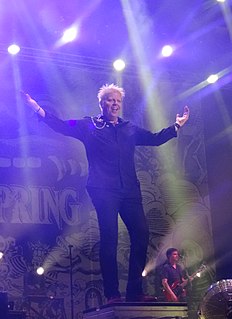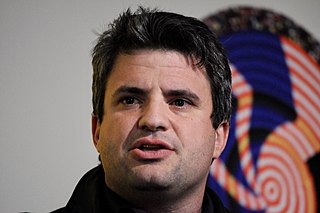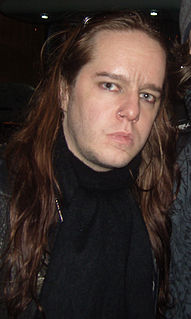A Quote by Trevor Noah
There's more outrage on Twitter about a One Direction split or about what one band member said to another than there is about institutionalized racism and something huge.
Related Quotes
There's something undeniably oxymoronic about a 'successful' rock n' roll band. Who wants to hear a bunch of success stories whining about their success? More importantly, what can be the drive behind a band, what can they have to rage against when they are successes? That's a dichotomy every successful band wrestles with.
Racism is not about hurtful words, bruised feelings, political correctness, or refusing to call short people 'vertically challenged.' Racism is about the power to treat entire groups of people as something less than human—for the benefit of that power. That’s why a Native American sports mascot is far from harmless.
When people say stuff to us casually in reviews, if they write about it in a condescending way with really gendered language, that's not really about me. It used to hurt my feelings more than it does now. That's not about us as a band or me as a person. That's about how you feel about women, and that's a societal thing.
I want my music to be something that people use in order to access parts of themselves. So in that sense, every piece I write is about all emotions at once, about the lines in between. It's never only about one thing or another. It's emotionally getting at those things that we can't really describe - things for which we don't have labels. So yes, it's about something, and it has a use. It's neither about nothing nor about something concrete - it's about what you bring to it as a listener.
To begin with, the key principle of American indie rock wasn't a circumscribed musical style; it was the punk ethos of DIY, or do-it-yourself. The equation was simple: If punk was rebellious and DIY was rebellious, then doing it yourself was punk. 'Punk was about more than just starting a band,' former Minutemen bassist Mike Watt once said, 'it was about starting a label, it was about touring, it was about taking control. It was like songwriting; you just do it. You want a record, you pay the pressing plant. That's what it was all about.'
Nothing is more debilitating than to care about something you can't do anything about. And you can't do anything about your adult children. You can want better for them, and maybe even begin to provide something for them, but in the long run, you cannot do anything about someone else's vibration other than hold them in the best light you can, mentally, and then project that to them. And sometimes, distance makes that much more possible than being up close to them.
You have to be careful with fans, they'll turn on you. They turn quick. Twitter can go dark fast. If you talk about something serious on Twitter, you better be ready. If you try to pull out real facts or talk about political opinions or something religious, forget it. Like if people asked me who I was voting for, you couldn't touch that one.
This film isn't about "white racism", or racism at all. DEAR WHITE PEOPLE is about identity. It's about the difference between how the mass culture responds to a person because of their race and who they understand themselves to truly be. And this societal conflict appears to be one that many share.


































